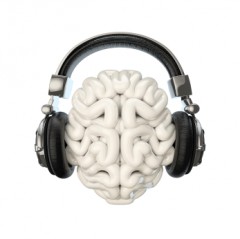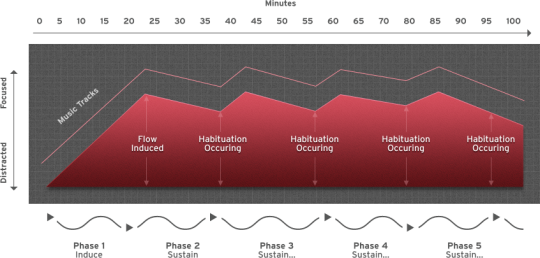Can Neuro-Music Boost Your Productivity?
 Work environments today are noisy and distracting. As Maria Konnikova writes in a recent New Yorker article, open office plans are a big culprit. One study describes the effects of open environments as “damaging to the workers’ attention spans, productivity, creative thinking, and satisfaction.” One effect of open environments is that now many office workers sport headphones and use music to reduce distraction levels.
Work environments today are noisy and distracting. As Maria Konnikova writes in a recent New Yorker article, open office plans are a big culprit. One study describes the effects of open environments as “damaging to the workers’ attention spans, productivity, creative thinking, and satisfaction.” One effect of open environments is that now many office workers sport headphones and use music to reduce distraction levels.
Music isn’t necessarily a panacea for increasing productivity; it can be a distraction itself. Konnikova cites a study by psychologist Nick Pelham that showed music impaired the mental acuity of his subjects. But one company, focus@will, claims to have the solution. They produce music tracks they say have been optimized for allowing the listener to focus and concentrate.
Specifically, the firm says their music is paced to get the listener into “concentration flow” and then prevent habituation by introducing timed variations. Their website states,
We’ve learned that people working or studying tend to take about 20 minutes to acclimate to their environment enough to really focus on the task at hand. It takes time for your brain to get used to a stimulus and start “tuning it out” in a process called “habituation”.
Each piece of music phase sequenced by focus@will has a specific role in influencing how your brain habituates, enhancing your focus and reducing distractions. Characteristics such as musical key, intensity, arrangement, speed, emotional values, recording style, and much more determine what is played where and when.
This illustration, they say, shows how their music changes to prevent habituation and maintain focus.

focus@will includes a “Science Primer” that explains the research their music is based on and includes 30+ citations. Here’s one short excerpt:
Listening to music with soothing aspects, that plays at 60 beats per minute, can decrease neural activity, and lead to a relaxed, but awake state called alpha state[11] that is defined by an increase in alpha brain waves and a decrease in higher activity beta waves. Increases in alpha waves have been tied to a psychological state of decreased self-awareness, timelessness, and motivation known as “flow”. Songwriters, musicians, writers, athletes, and meditators are all people who separately describe the same experience when flow state is reached.[15]
I listened to some of the tracks, and I was able to do some writing work with reasonable concentration. I’d be hard pressed to say the focus@will music was responsible, or that it performed better than other music I could have used for the same purpose.
I’m partial to Pandora’s playlist generation algorithm, where if you seed a station with one or more songs or artists, they will do a very decent job of finding other music with similar characteristics. Of course, the song durations aren’t optimized, and occasionally an annoying track can appear (e.g., a live performance that is musically appropriate but includes the artist talking to the audience). focus@will is sort of neuro-Pandora with limited variety and preset channels.
Do you have a preferred way to screen out noise and enhance concentration? Does a particular kind of music work well for you? Leave a comment with your thoughts. And, if you try focus@will (you can test it out for free), let us know what you think.
